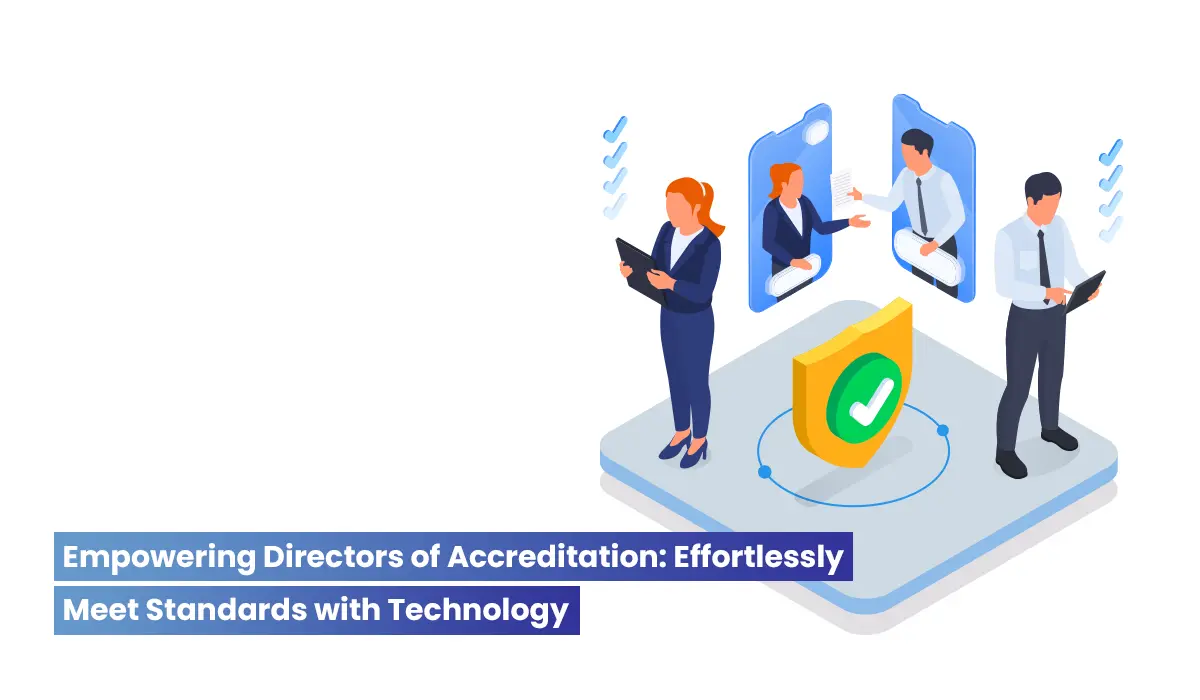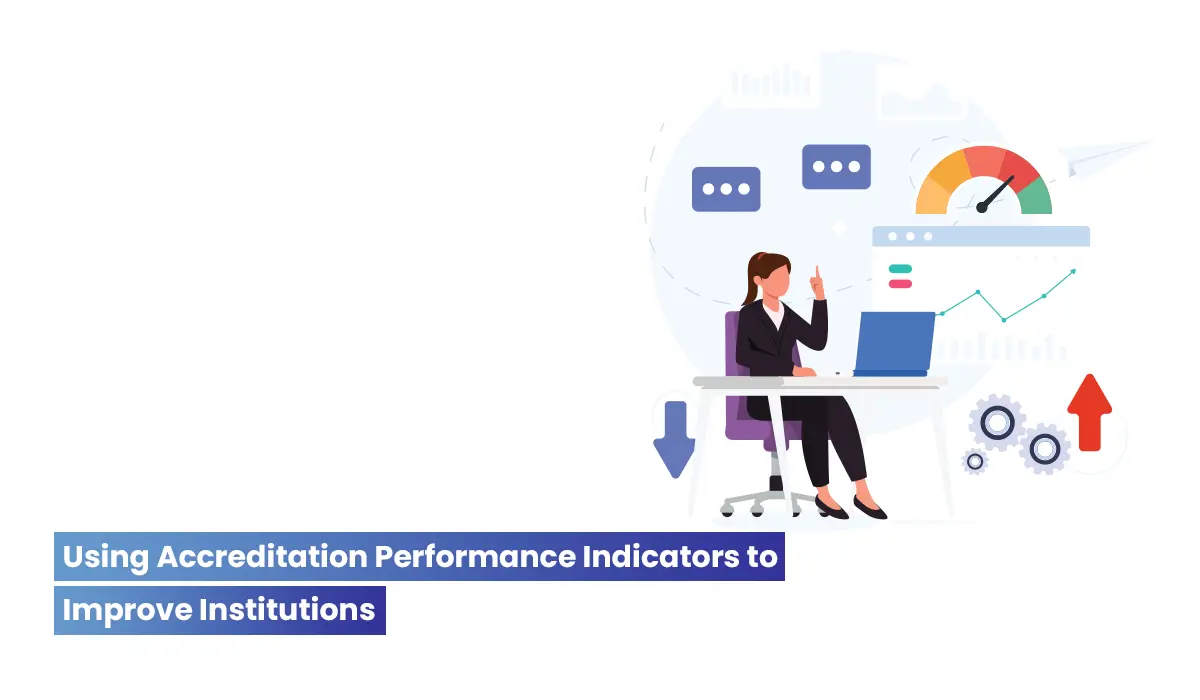Understanding the ACBSP Accreditation Process

Accreditation is an important process for educational institutions, particularly business schools. It provides a level of assurance to students, employers, and other stakeholders that the institution meets certain standards for quality and effectiveness. One of the major accreditation bodies for business schools in the United States is the ACBSP accreditation or the Accreditation Council for Business Schools and Programs.
In this blog post, we will explore the ACBSP accreditation process, including its benefits, standards and criteria, and steps involved.
What is ACBSP?
The Accreditation Council for Business Schools & Programs (ACBSP) is a specialized accrediting organization that focuses on business education programs across the globe. Its mission is to promote continuous improvement and recognize excellence in the accreditation of business education programs around the world. ACBSP currently accredits more than 1,200 programs at over 200 institutions in the United States and other countries.
History of the ACBSP accreditation
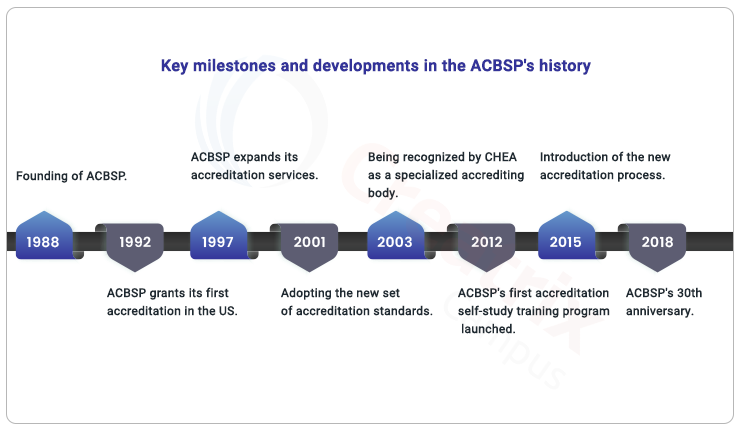
The ACBSP (Accreditation Council for Business Schools and Programs) was established in 1988 as a specialized accrediting organization for business education programs. The organization was founded with the goal of improving the quality of business education and promoting excellence in teaching, research, and service.
The ACBSP accreditation standards were developed through a rigorous process that involved input from business educators, employers, and other stakeholders. The standards were designed to evaluate the quality and effectiveness of business programs in a holistic manner, taking into account factors such as mission, leadership, strategic planning, student learning, faculty qualifications and development, and educational support services.
Since its inception, ACBSP has grown to become one of the leading specialized accrediting organizations for business education programs, with more than 1,200 accredited institutions in over 60 countries. ACBSP accreditation is widely recognized by employers, students, and other stakeholders as a mark of quality and excellence in business education.
Over the years, ACBSP has continued to evolve and adapt to changes in the business education landscape. In recent years, the organization has expanded its focus to include issues such as sustainability, globalization, and technological innovation, reflecting the changing needs of business students and the wider business community.
The leadership of ACBSP accreditation
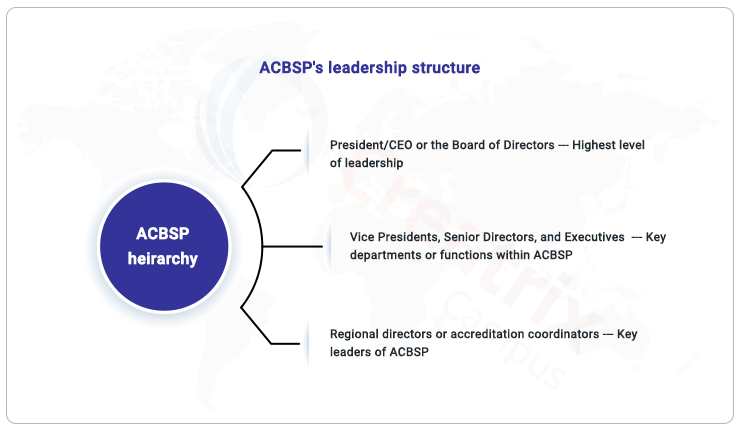
The ACBSP (Accreditation Council for Business Schools and Programs) is governed by a Board of Directors, which is responsible for setting the strategic direction of the organization and overseeing its operations. The Board is made up of business educators and professionals from a variety of institutions and industries.
The day-to-day operations of the ACBSP are managed by an executive leadership team, which is led by the President and CEO. The President and CEO are responsible for the overall management and administration of the organization, including its accreditation activities, marketing and communication efforts, and member services.
The ACBSP also has a team of accreditation staff, who are responsible for working with institutions seeking accreditation and conducting the accreditation review process. The accreditation staff includes experienced business educators and professionals, who are trained in the ACBSP accreditation standards and criteria.
In addition to its internal leadership, the ACBSP also relies on a network of volunteers to support its operations and activities. These volunteers include site visit team members, who are responsible for conducting on-site reviews of institutions seeking accreditation, and members of various committees and task forces, who help to develop and refine the ACBSP accreditation standards and criteria.
The ACBSP's volunteer network includes business educators and professionals from around the world, who bring a wealth of knowledge and experience to the organization.
ACBSP accreditation indicates that a business program has met specific standards of quality, including curriculum, faculty, facilities, and student support services. It is considered to be beneficial for educational institutions and their business programs as it helps to enhance the credibility and reputation of the institution and the program. It also provides assurance to students and employers that the program meets high-quality standards and is focused on preparing students for successful careers in the field of business.
However, it's important to note that accreditation is not the only factor to consider when choosing an educational institution or program. Other factors such as program cost, location, faculty expertise, student support, and career outcomes should also be considered. Ultimately, it's up to the individual to evaluate their personal goals and needs to determine if ACBSP accreditation aligns with their educational and career aspirations.
Benefits of ACBSP accreditation
ACBSP accreditation, which stands for Accreditation Council for Business Schools and Programs, is a recognized and prestigious form of accreditation for business programs at the associate, baccalaureate, master, and doctorate degree levels.

Some of the benefits of ACBSP accreditation include:
- Recognition of academic excellence in business education
- Enhanced reputation and credibility
- Access to networking and professional development opportunities
- Increased student enrollment
- Enhanced reputation and credibility, making it more attractive to potential students, employers, and other stakeholders.
- Improved curriculum and teaching quality
- Access to resources and networking opportunities including conferences, workshops, and research opportunities.
- Increased career opportunities for graduates
- Eligibility for financial aid and scholarships
- Continuous improvement with regular assessments and evaluations
- Transferability of credits
- Compliance with regulatory requirements
- Alignment with industry standards
- Strong faculty and staff with the necessary skills, experience, and qualifications
- Assurance of ethical practices that the program adheres to ethical and professional standards in all aspects of its operations
- Enhanced student learning outcomes
- Data-driven decision-making for continuous improvement
Eligibility to apply for ACBSP
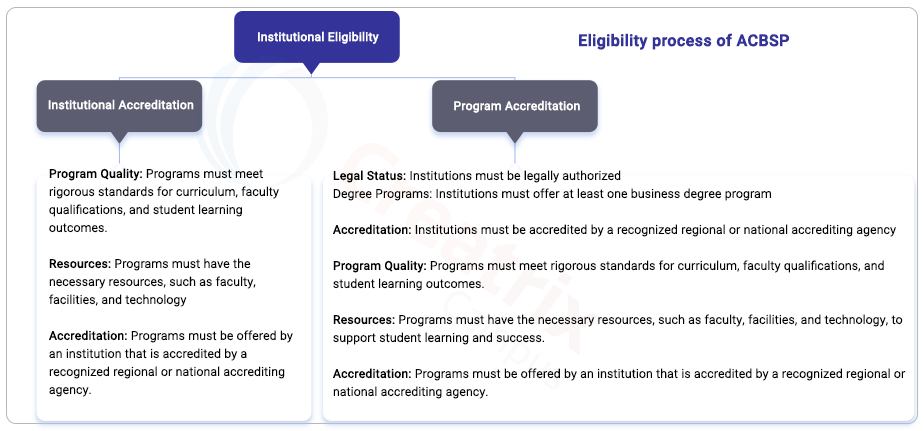
To apply for ACBSP accreditation, an institution must first meet certain eligibility requirements including:
- The institution must hold or be in the process of seeking institutional accreditation from a recognized regional or national accrediting body.
- The institution must have degree-granting authority from the appropriate state or national agency.
- The institution must offer one or more business programs that are at least two academic years in length and lead to a recognized business degree at the associate, bachelor's, master's, or doctoral level.
- The institution must employ full-time and/or part-time faculty who have at least a master's degree in the relevant business discipline or a related field.
- The institution must provide adequate administrative and support services to ensure the effective delivery of its business programs.
Once an institution meets these eligibility requirements, it can begin the accreditation process by submitting an application and undergoing a self-study, the details of which are in the subsequent sections.
What are the types of ACBSP accreditation?
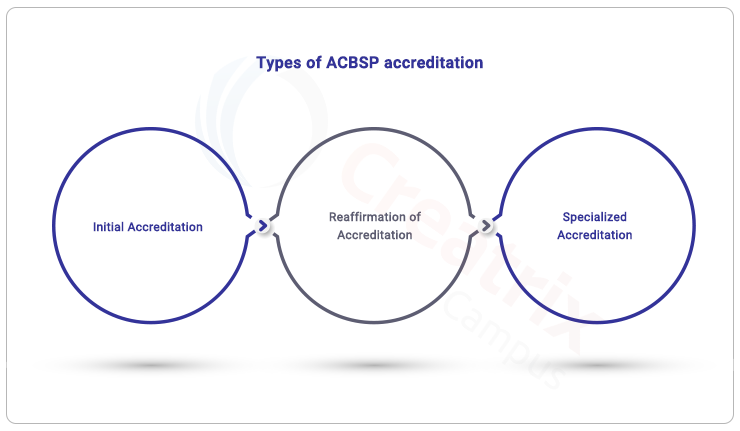
The ACBSP (Accreditation Council for Business Schools and Programs) offers three types of accreditation. All these three types of accreditation require institutions to demonstrate their compliance with the ACBSP accreditation standards and criteria, which are designed to ensure the quality and effectiveness of business programs and operations.
Initial Accreditation
This type of accreditation is for business programs that have not previously been accredited by ACBSP. Institutions seeking initial accreditation must meet all eligibility requirements and undergo the full accreditation process, including a self-study and an on-site peer review.
Reaffirmation of Accreditation
This type of accreditation is for business programs that have previously been accredited by ACBSP and are seeking to have their accreditation status reaffirmed. Institutions seeking reaffirmation of accreditation must provide evidence of continued compliance with ACBSP accreditation standards and criteria.
Specialized Accreditation
This type of accreditation is for business programs that offer specialized accreditation in addition to their ACBSP accreditation. Specialized accreditation may be awarded in areas such as accounting, finance, marketing, or management, among others. Institutions seeking specialized accreditation must meet additional criteria and undergo additional evaluations beyond those required for initial or reaffirmation of accreditation.
ACBSP standards and criteria
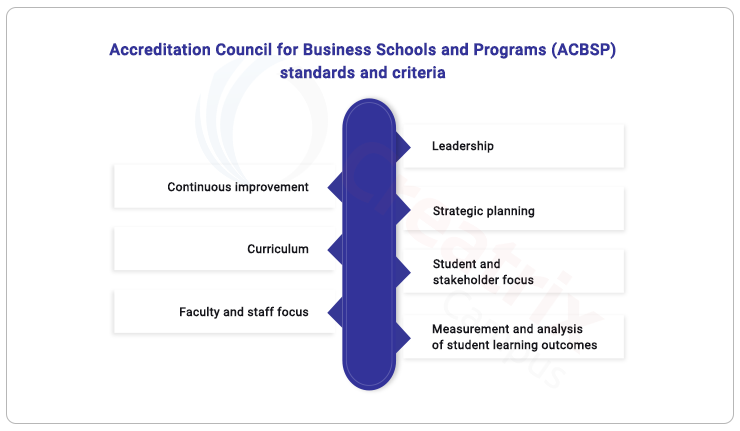
ACBSP uses a set of standards and criteria to evaluate business schools and determine their eligibility for accreditation. These standards and criteria cover several areas, including:
Leadership:
The institution must have effective leadership that is committed to continuous improvement and excellence. Strategic planning: The institution must have a strategic plan that guides its decision-making and ensures alignment with its mission and goals.
Student and stakeholder focus:
The institution must be student-centered and must prioritize the needs and expectations of its stakeholders, including students, faculty, staff, and employers.
Measurement and analysis of student learning outcomes:
The institution must have a comprehensive assessment plan that measures student learning outcomes and provides evidence of the effectiveness of its programs.
Faculty and staff focus:
The institution must attract, develop, and retain qualified faculty and staff who are committed to the institution's mission and goals.
Curriculum:
The institution must have effective processes in place to manage its educational and business operations, including curriculum design, program delivery, and resource allocation.
Continuous improvement:
The institution must demonstrate a commitment to continuous improvement by regularly assessing its programs and operations and making changes as needed.
ACBSP accreditation process
The ACBSP accreditation process is a multi-step and rigorous process that evaluates the quality and effectiveness of an institution's business programs and operations. The procedure could take two years to finish. The steps are explained in more detail below.

Step 1: Meeting the eligibility requirements
The institution must first meet the eligibility requirements to apply for ACBSP accreditation, which includes institutional accreditation, degree-granting authority, business program(s), teaching faculty, and administrative and support services.
Step 2: Initial application
The institution must submit an application and pay the appropriate fee to begin the accreditation process.
Step 3: A thorough self-study
The institution must conduct a comprehensive self-study, which is a detailed analysis of its business programs and operations. The self-study report must address all of the ACBSP accreditation standards and criteria and must include evidence of compliance.
Step 4: On-site peer review
An on-site peer review team, composed of business educators and professionals, visits the institution to review its self-study report and evaluate its compliance with the ACBSP accreditation standards and criteria. The team also meets with faculty, staff, students, and other stakeholders to gather additional information and perspectives.
Step 5: Accreditation decision
Based on the self-study report and the on-site peer review, the Accreditation Council for Business Schools and Programs makes a decision about the institution's accreditation status. The decision can be initial accreditation, reaffirmation of accreditation, or denial of accreditation.
Step 6: Ongoing compliance reporting
Accredited institutions must continue to demonstrate their compliance with ACBSP's accreditation standards and criteria by submitting annual reports and undergoing periodic reviews.
How to prepare for the ACBSP accreditation?
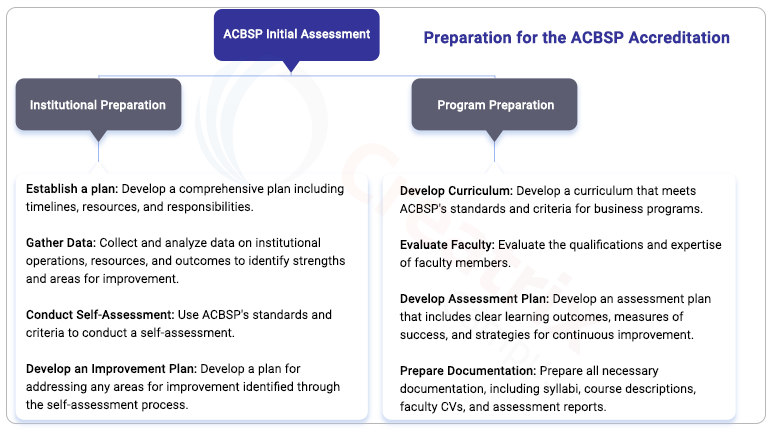
- Review the ACBSP standards and criteria to determine what is required for accreditation.
- Conduct a self-assessment to determine how well your program currently meets the ACBSP standards.
- Create a plan for improvement and draft out timelines, responsibilities, and resources needed to achieve the goals.
- Develop and implement policies and procedures, such as those related to curriculum development, faculty qualifications, and assessment and evaluation.
- Gather and organize documentation including course syllabi, faculty CVs, student handbooks, and assessment reports.
- Prepare for the site visit by ensuring that all documentation is organized and readily accessible, and by scheduling meetings and presentations with key stakeholders.
- Engage in continuous improvement activities by regularly assessing and evaluating your program's performance, and making necessary improvements to ensure ongoing compliance with the ACBSP standards.
- Communicate with stakeholders about the accreditation process and the importance of achieving and maintaining accreditation.
- Train faculty and staff to ensure they have the skills and knowledge needed to support the ACBSP standards and criteria.
- Engage in benchmarking and peer networking to learn from other programs that have gone through the accreditation process.
- Conduct mock site visits to simulate the actual accreditation process and identify any areas that may need improvement.
Pricing of the ACBSP process
The pricing for the ACBSP accreditation process can vary depending on the type and size of the institution, as well as the level of accreditation sought. However, here is a general breakdown of the fees associated with the process:
Initial Accreditation Fee: The fee for institutions seeking initial accreditation is $12,500. This fee covers the cost of the on-site peer review team and other administrative expenses.
Reaffirmation of Accreditation Fee: The fee for institutions seeking reaffirmation of accreditation is $8,000. This fee covers the cost of the on-site peer review team and other administrative expenses.
Annual Fee: Accredited institutions are required to pay an annual fee, which ranges from $1,000 to $3,000 depending on the size of the institution.
Other Expenses: In addition to the fees mentioned above, institutions may incur other expenses during the accreditation process, such as travel and lodging expenses for the on-site peer review team, costs associated with the self-study process, and other administrative expenses.
How many business schools are so far ACBSP accredited?
As of February 2023, there are over 1,200 business schools in more than 60 countries that have achieved ACBSP accreditation. ACBSP-accredited institutions include public and private universities, community colleges, and other types of educational institutions that offer business programs at the associate, baccalaureate, master's, and doctoral levels.
ACBSP accreditation is widely recognized by employers, students, and other stakeholders as a mark of quality and excellence in business education. The list of accredited business schools can be found in this link.
Automate ACBSP with Creatrix Accreditation Software
ACBSP accreditation is a valuable and highly respected accreditation for business schools in the United States and around the world. The standards and criteria used by ACBSP provide a comprehensive framework for evaluating the quality and effectiveness of business education programs, ensuring that students receive a high-quality education that prepares them for success in the business world.
Contact team Creatrix to automate your ACBSP accreditation process with Accreditation Management Software. You will also get a chance to know how other business schools are successfully ACBSP-accredited with our robust accreditation framework.
Disclaimer:
Creatrix Campus is a robust platform that is committed to providing our clients with high-quality services and tools to assist them in achieving their accreditation goals. Our product can provide real-time updates on the status of the accreditation process, enabling organizations to make informed decisions and respond quickly to any changes or requirements. Automating the accreditation process allows organizations to streamline their operations, minimize the likelihood of errors, and concentrate on their core activities that contribute to their achievements. This can result in significant time savings and enhance overall efficiency.

